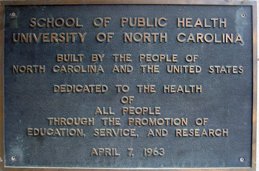In September, 2008, the School of Public Health at UNC Chapel Hill was named the Gillings School of Global Public Health. The mission is to advance the impact of economic and methodological research on health in both the developed and developing world.
That's funny, because the School of Public Health's website lists this as it's mission:
Our mission is to improve public health, promote individual well-being, and eliminate health disparities across North Carolina and around the world.
Maybe Gillings needs to send Rimer an e-mail and tell her to update it. I'm sure she'll get right on it. Seriously, there might be another few million dollars in it for the School, and with this economy, I'm sure she's desperate for funding. Of course as long as Gillings can find a way to get more bang for his buck by making a contribution to the School rather than signing a contract with it on Quintiles letterhead, I'm sure he will give more money. All bets are off if President Obama and Congress continue to discuss tightening the restrictions on tax deductible charitable contributions.
Gillings' money is currently funding 14 Gillings Innovation Labs, as they're called, 3 of which are related to work done by Quintiles. The first lab that was announced last year was the Center for Innovative Clinical Trials. The Center is the brainchild of Gillings himself, who met with Dean Rimer and select faculty members in late 2006, months before Gillings agreed to the $50 million contribution. At least two faculty members expressed greater interest in establishing a center for quantitative genetics and genomics, but apparently either Gillings was more interested in funding research regarding clinical trials, or at least the administration felt that way. The Center not only serves to speed clinical trials in an effort to "serve the research needs of the industry community," but also to "have a direct impact on regulatory issues related to the FDA." According to the website, the Center for Innovative Clinical Trials will work closely with the Collaborative Studies Coordinating Center, which is directed by Lisa LaVange, former Vice President of Biostatistics at Quintiles. Gary Koch, professor of Biostatistics and co-founder of Quintiles, is listed as an expert for the Center for Innovative Clinical Trials, and Julie MacMillan, former Senior Vice President of Corporate Administration for Quintiles, is the Managing Director of Carolina Public Health Solutions, the entity created within the School to administer grant funding for the Gillings Innovation Labs (GIL). The other two projects that have received GIL funding are focused on vaccines and monitoring the effect of medications in elderly patients.
Gillings' influence is also apparent in the number of recent guest speakers who have been invited to talk about clinical trials or pharmaceuticals at the School. Robert Temple, Director of the Office of Medical Policy of the FDA’s Center for Drug Evaluation and Research, delivered a talk titled "FDA Drug Approval Process, Potential Efficiencies and Active Control Trials" at the School on March 6, 2008. The School said Temple is "often described as one of the most influential officials in the U.S. Food and Drug Administration's drug regulatory process." Perhpas that's why Gillings and officials from Quintiles were interested in an exclusive opportunity to meet with Temple over dinner, following his talk. See pages 46 and 50 of misc.pdf for the invitation, and review other public records regarding Gillings influence over the School at: http://carolina.savethename.googlepages.com/uncschoolofpublichealth-publicrecords




No comments:
Post a Comment